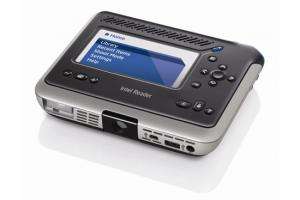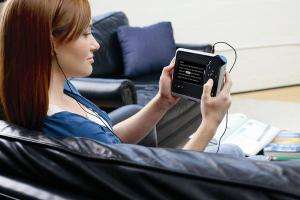Intel Reader Transforms Printed Text to Spoken Word (w/ Video)

Intel Corporation today announced the Intel Reader, a mobile handheld device designed to increase independence for people who have trouble reading standard print.
The Intel Reader can assist the estimated 55 million people in the U.S. who have dyslexia or other specific learning disabilities, or have vision problems such as low-vision or blindness, which makes reading printed words difficult or impossible.
The Intel Reader, about the size of a paperback book, converts printed text to digital text, and then reads it aloud to the user. Its unique design combines a high-resolution camera with the power of an Intel Atom processor, allowing users to point, shoot and listen to printed text. The Intel Reader will be available in the United States through select resellers, including CTL, Don Johnston Incorporated, GTSI, Howard Technology Solutions and HumanWare.
When the Intel Reader is used together with the Intel Portable Capture Station, large amounts of text, such as a chapter or an entire book, can be easily captured for reading later. Users will have convenient and flexible access to a variety of printed materials, helping to not only increase their freedom, but improve their productivity and efficiency at school, work and home. The Intel Reader has been endorsed by the International Dyslexia Association as an important advance in assistive technology. Additionally, Intel is working with the Association of Assistive Technology Act Programs, the Council for Exceptional Children, Lighthouse International, the National Center for Learning Disabilities and the National Federation of the Blind to help reach and address the needs of people who have difficulty reading print.
"The Intel Digital Health Group's expertise is in finding innovative technology solutions to improve quality of life," said Louis Burns, vice president and general manager of Intel's Digital Health Group. "We are proud to offer the Intel Reader as a tool for people who have trouble reading standard print so they can more easily access the information many of us take for granted every day, such as reading a job offer letter or even the menu at a restaurant."
The original concept for the Intel Reader came from Ben Foss, a researcher at Intel who was identified in elementary school as one of the estimated 20 percent of people nationwide who have symptoms of dyslexia. Throughout high school, college and graduate school, he had to depend on others to read to him or work through the slow process of getting words off of a page himself. As an adult, much of the content he wanted, from professional journals to pleasure reading, just wasn't available in audio form.
"As someone who is part of this dyslexic community, I am thrilled to be able to help level the playing field for people who, like me, do not have easy access to the printed word," Foss said. "Feelings of loneliness are often the experience of not being able to read easily. We hope to open the doors for people in these communities. The Intel Reader is a tool that can help give people with dyslexia, low-vision, blindness or other reading-based disabilities access to the resources they need to participate and be successful in school, work and life."
More information: For more information on the Intel Reader or where to purchase, visit reader.intel.com





















